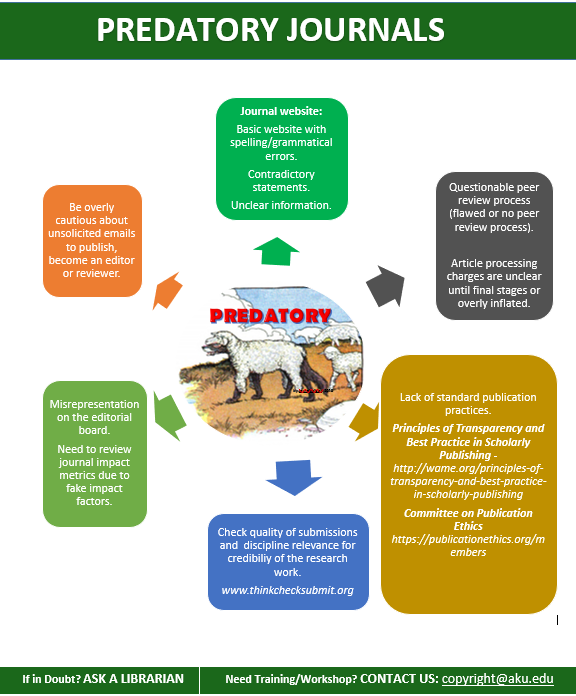Open Access Publishing and Predatory Journals
Open Access Publishing
| Academic & scientific research and scholarship has been moving to online publishing for several years. In this process of creating e-journals, a new paradigm for scholarly publishing emerged, Open Access Publishing. Open Access (OA) journals use a funding model whereby the publishing author/institution pays the cost of the publishing process but keeps their copyright. In the traditional model, authors did not pay for publishing but relinquished their copyright to publishers who then sold access to their publications. As an example, one major publisher makes about one billion dollars a year selling scholarly publications, often to the very institutions that financed the research they came from.
The Open Access model gives authors and institutions free access to published scholarship. As such, it provides all researchers on-going, free access to new knowledge. The Directory of Open Access Journals lists around 11,000 OA journals.
|

|
|---|
Predatory Journals and Publishers
Unfortunately, the Open Access publishing model, has recently given rise to fraudulent publishers whose sole purpose is to make money from authors by offering to publish their research in dubious journals. Such journals are termed as ‘Predatory Journals’.
These ‘Predatory Journals’ and dubious publishers lure academic authors with the promise of publishing their research articles, usually through unsolicited email requests. Many of these journals post false impact factors on their websites, and make offers such as labeling an article as “article of the year” for an extra 200 USD, or publishing articles as long as they contain only 20% of “new” material. They often have a very weak peer review process (if any at all) and will, in fact, publish anything if the author pays the fees. They may sometimes even ask researchers to join their Editorial Board or participate in “fake” conferences. Usually they won’t mention publication fees on their website, but once an article is submitted with the copyright agreement, the author receives a surprise invoice which can be as high as 2000 USD. Some authors fall prey to this temptation for a quick and easy way to get published. Beware that publishing in such journals might not be recognized in academic promotion processes. Also, even if your article was really good, you will never be able to publish it anywhere else and it will not be included in any serious indexing site.
Fake Impact Factor providers
One the most frequently used means of determining the quality of academic journals is to consult their impact factor. Unfortunately, predatory journals have now found a way around this standard measure of quality.
The de facto standard service that determines the impact factor of journals is the Institute of Scientific Information, and the results are published in Thompson-Reuters’ “Journal Citation Report”. This source has become the authority in this area. But there are now several other new services (mostly fake) who claim to determine the impact factor of journals. They essentially serve predatory journals by giving fake impact factors to whoever pays them.
So when you see the impact factor of a journal, and are tempted to publish there, make sure you can identify the service who determined it before you take it seriously.
If you are not sure where an impact factor comes from, you can consult the list of journals indexed by the Institute for Scientific Information, to determine if they index it, at Intellectual Property & Science.
Identifying predatory journals / publishers and fake Impact Factor providers
We encourage AKU authors to publish in Open Access journals but they should be cautious and on the lookout for offers from “Predatory Journals”. You can use the following clues & criteria for selecting a journal for publishing your research.
Journal Impact Factor (IF) : High IF is a good measure of journal quality (Note: It takes a few years for a new journal to get a significant impact factor and get indexed). Keep in mind that there are now fake Impact Factor providers who will, for a fee, assign fake impact factors to journals willing to pay. Please read the following articles on this:
The story of fake impact factor companies and how we detected them
Counterfeit Impact Factors are Devaluing the Real One
Journals indexed in a respected citation databases such as ‘Index Medicus’ PubMed, CINAHL, ERIC, Thompson Reuters Web of Science, SciVerse Scopus etc. have usually been vetted by the indexing agency as “serious”. Check your library as AKU has access to several of these.
If the Organization, Publisher of the Journal is reputable. You can check publishers’ membership to the Open Access Scholarly Publishers Association (OASPA) members are bound by a code of conduct and held to excellent standard, transparent publishing practices etc. Also check if the Journal is included in the Directory of Open Access Journals. Any journal included in the index has been vetted and can be considered “serious"
If the editorial board members are recognizable experts known for their contribution to the field. You can do a Google Scholar search to check.
The quality of the website of the Journal: check for visible grammatical, content errors and broken web-links.
If you receive a publishing offer from a journal/publisher through spam (unsolicited email), then be cautious. Recognized journals do not solicit publication from potential authors.
Publishing fees should be clear with full contact details including email, postal address and working telephone number.
Scholarly Open Access Website
Jeffrey Beale, a librarian from the University of Colorado, used to maintain a web site on publishing up to 2017, that is now archived https://predatoryjournals.com/ . although the list is old and has remained un-updated, it remains a useful guide with a list of predatory journals and publishers.
Users are also advised to visit www.thinkchecksubmit.org for further guidance.
Please consult your local librarian who can check and give you feedback on journals and publishers, as well as any information you require on open access publishing and whether the journal you wish to publish in may be predatory.

